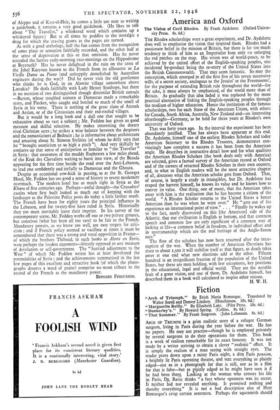America and Oxford
The Vision of Cecil Rhodes. By Frank Aydelotte. (Oxford Univer- sity Press. 8s. 6d.) THE Rhodes scholarships were a great experiment, and Dr. Aydelotte does well to emphasise the vision that inspired them. Rhodes had a passionate belief in the mission of Britain, but there is far too much tendency to think of him as an Imperialist bent only en enlarging the red patches on the map. His vision was of world-peace, to be achieved by the united effort of the English-speaking peoples, one incidental by-product being the re-entry of the United States into the British Commonwealth. That may seem fantastic. So may the conception, which emerged in all the first five of his seven successive wills, of a secret society, analogous to the Jesuits' or the Freemasons', for the purpose of extending British rule throughout the world—for the sake, it must always be emphasised, of the world more than of Britain. As gradually that idea faded it was replaced by the more practical alternative of linking the English-speaking peoples through the medium of higher education. Hence the institution of the famous scholarships, two for each State of the American Union, with others for Canada, South Africa, Australia, New Zealand and—an interesting afterthought—Germany, to be held for three years at Rhodes's own university of Oxford.
That was forty years ago. In the interval the experiment has been abundantly justified. That has always been apparent at this end. Dr. Aydelotte, himself one of the earliest Rhodes Scholars and today American Secretary to the Rhodes Trustees, demonstrates con- vincingly how complete a success it has been from the American angle. He describes in instructive detail how and for what qualities the American Rhodes Scholars (the book deals only with America) are selected, gives a factual survey of the American record at Oxford and of the careers of returned Rhodes Scholars in their own country, and, in what to English readers will be the most attractive chapter of all, discusses what the American scholar gets from Oxford. That, of course, is largely a study in intangibles, but Dr. Aydelotte has reaped the harvest himself, he knows its value and he knows how to convey its value. One thing, one of many, that the American takes away with him is the realisation that he has become a citizen of the world. " A Rhodes Scholar returns to the United States a better American than he was when he went over." He " gets out of his experience an international point of view." . . . " Finally he wakes up to the fact, rarely discovered on this [the American] side of the Atlantic, that our civilisation is English at bottom, and that common speech and common law are only significant of a common way of looking at life—a common belief in freedom, in individual effort and in sportsmanship which are the real heritage of the Anglo-Saxon race."
The flow of the scholars has now been resumed after the inter- ruption of the war. When the number of American Oxonians has risen to about I,5oo it will stabilise itself at that figure, as death takes away at one end what new elections add at the other. Fifteen hundred is an insignificant fraction of the population of the United States, but these are men holding, with few exceptions, key positions in the educational, legal and official world. They are the notable fruit of a great vision, and one of them, Dr. Aydelotte himself, has described them in a book well calculated to inspire other visions.
H. W. H.


































 Previous page
Previous page